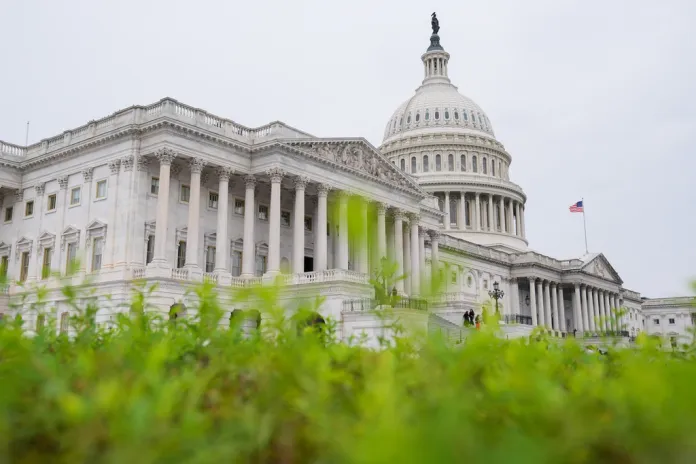


The federal government entered its first shutdown in nearly seven years on Wednesday after a bitterly divided Congress failed to pass more funding by a midnight deadline.
Lawmakers remained deadlocked over Democratic demands to extend expiring enhanced Obamacare subsidies. Hours earlier, the Senate failed to overcome a 60-vote filibuster and approve a short-term funding proposal passed by the House that did not address the health insurance tax credits.
Recommended Stories
- Thune hopeful GOP will pick up enough Democratic votes to reopen government
- Trump posts photo of 'Trump 2028' hats at leadership meeting with Jeffries and Schumer
- White House withdraws Trump nominee to oversee labor statistics
FEDERAL AGENCIES RELEASE GOVERNMENT SHUTDOWN CLOSURE PLANS: WHAT TO KNOW
In a sign of growing division among Democrats, caucus members Catherine Cortez Masto (D-NV) and Angus King (I-ME) joined Sen. John Fetterman (D-PA) in siding with Republicans, all of whom voted in favor of the GOP stopgap funding bill, except for libertarian Sen. Rand Paul (R-KY).
A dueling Democratic proposal with progressive policy priorities, including a permanent extension of the pandemic-era subsidies, also failed.
Both parties appeared ready for a protracted political fight, with GOP congressional leaders insisting Democrats help pass funding through Nov. 21 to negotiate a full-year budget and Obamacare subsidies. Invoking their filibuster leverage, Democrats stood firmly with demands that a Republican-dominated Washington first pass an extension.
Senate Minority Leader Chuck Schumer (D-NY) declined to outline a strategy to get out of a shutdown once one commences. Consternation over a solution drove Schumer and other Democrats in March to side with Republicans and avert a shutdown. But facing a vocal base hungry to resist Trump and a Republican-controlled Congress, Democrats remained largely unified in their opposition to provide the votes required to keep the government open.
“What gives us the ability to win this argument with the American people is we are standing for what they want for healthcare and [Republicans] are not,” Schumer told reporters.
Senate Republican leaders vowed to oppose any healthcare talks while the government remains shuttered and expressed optimism about peeling off more Democrats in the coming days on revotes for the same funding proposals. With Paul’s dissent and a 53-47 majority, Republicans will need eight Democrats to vote across the aisle.
LIVE UPDATES: GOVERNMENT SHUTDOWN DEADLINE EXPIRES
“There are others out there, I think, who don’t want to shut down the government but are being put in a position by their headship that… ought to make all of them very uncomfortable,” Senate Majority Leader John Thune (R-SD) said on Tuesday. “Tonight was evidence that there is some movement there, and we’ll allow our Democrat colleagues some additional opportunities to vote to… open it back up.”
The shutdown marks the first of its kind since President Donald Trump’s first term, when the longest-ever one lasted more than a month over his demands for additional southern border wall money. The partial shutdown, lasting for 35 days in December 2018 and January 2019, cost the economy an estimated $11 billion, per the Congressional Budget Office.
But unlike prior shutdowns, Trump vows to use the episode to further shrink the federal workforce and government spending with mass layoffs and rolling back government programs or benefits. Trump and his White House budget office director, Russell Vought, previewed mass firings that Democrats condemned as “intimidation.”

“We can do things during the shutdown that are irreversible, that are bad for them, and irreversible by them,” Trump said.
Schumer pointed to the rhetoric as evidence of the president having “admitted himself that he is using Americans as political pawns.”
The CBO estimated that 750,000 federal employees would be furloughed each day, amounting to about $400 million in lost or delayed compensation. Some agencies and programs remain funded from Trump’s “big, beautiful” bill signed into law earlier this year or other funding streams. However, most will shut down, and workers deemed essential will continue performing their duties without pay. Members of Congress and the military will continue to be paid, but most other federal government employees will not.
Seeking to avoid the negative political optics of departing the nation’s capital during a shutdown, Republicans will keep the Senate in session over the weekend to hold repeated votes on the House-passed stopgap measure. The chamber will return on Friday, following a day off on Thursday to observe the Yom Kippur Jewish holiday. House Democrats have criticized Speaker Mike Johnson (R-LA) for recessing the lower chamber after passing its short-term funding bill.
SENATE REJECTS DUELING FUNDING BILLS, TEEING UP GOVERNMENT SHUTDOWN AT MIDNIGHT
But new polling suggested Democrats could face challenges mitigating the political fallout associated with forcing a shutdown. A New York Times/Siena College survey showed that a minority of Democratic voters, 47%, support shuttering the government if the party’s healthcare demands are not met.
“[Schumer’s] being held hostage by the liberal wing of the party after he did the right thing in March. He was severely punished,” Senate Majority Whip John Barrasso (R-WY) said. “They’re not thinking ahead of the impact and the damage it’s going to do to the American people.”
